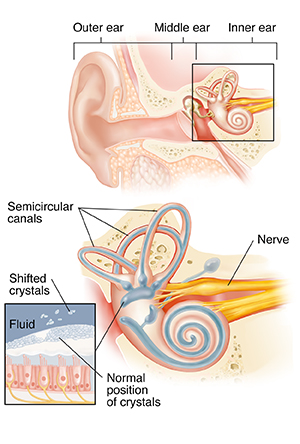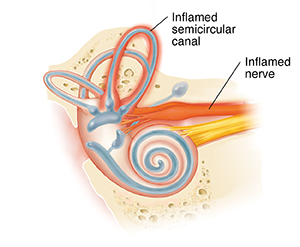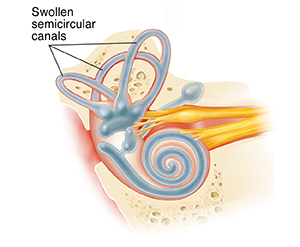Inner Ear Problems: Causes of Dizziness (Vertigo)
Benign positional vertigo (BPV)
This is the most common cause of vertigo. BPV is also called benign positional paroxysmal vertigo (BPPV). It happens when crystals in the ear canals shift into the wrong place. Vertigo usually occurs when you move your head in a certain way. This can happen when turning in bed, bending, or looking up. Because BPV comes on quickly, you should think about if you are safe to drive or do other tasks that need your full attention.

BPV:
-
Causes vertigo that lasts for seconds. Vertigo can occur several times a day, depending on body position.
-
Doesn’t cause hearing loss.
-
Often goes away on its own. But it may go away sooner with treatment.
Infection or inflammation
Sometimes the semicircular canals swell and send incorrect balance signals. This problem may be caused by a viral infection. Depending on the cause, your hearing can be affected (labyrinthitis). Or your hearing can remain normal (neuronitis).

Infection or inflammation:
You may need vestibular rehabilitation if you have balance problems that don't go away.
Meniere’s disease
This condition is uncommon. It happens when there is too much fluid in the ear canals. This causes increased pressure and swelling. It affects balance and hearing signals.

Meniere’s disease may:
-
Cause vertigo that lasts for hours
-
Cause hearing problems that come and go. The problems are usually in one ear and get worse over time.
-
Cause buzzing or ringing in the ears (tinnitus)
-
Cause a feeling of fullness or pressure in the ear
-
Cause any of these lasting symptoms: vertigo, hearing loss, tinnitus, or ear fullness
Other causes of vertigo
Vertigo can also be caused by:
© 2000-2025 The StayWell Company, LLC. All rights reserved. This information is not intended as a substitute for professional medical care. Always follow your healthcare professional's instructions.